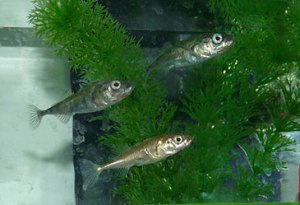Jul 28 2014
Acoustic disturbance has different effects on different species of fish, according to a new study from the Universities of Bristol and Exeter which tested fish anti-predator behaviour.
 Three-spined sticklebacks responded sooner to a flying seagull predator model when exposed to additional noise
Three-spined sticklebacks responded sooner to a flying seagull predator model when exposed to additional noise
Three-spined sticklebacks responded sooner to a flying seagull predator model when exposed to additional noise, whereas no effects were observed in European minnows.
Lead author Dr Irene Voellmy of Bristol's School of Biological Sciences said: "Noise levels in many aquatic environments have increased substantially during the last few decades, often due to increased shipping traffic. Potential impacts of noise on aquatic ecosystems are therefore of growing concern."
The team, which included Dr Julia Purser, Dr Steve Simpson and Dr Andrew Radford, used controlled laboratory experiments to investigate how acoustic disturbance, generated by playbacks of ship noise, changed the anti-predator behaviour of minnows and sticklebacks.
Dr Radford warned: "As appropriate anti-predator behaviour is crucial for survival, any detrimental effects of noise could lead to fitness consequences."
The current study demonstrates species-specific differences in response to noise, potentially driven by a range of underlying behavioural and physiological mechanisms.
Dr Simpson added: "If we want to effectively manage noise in the marine environment, we next need to assess the spatial scale over which individual animals and populations are affected. This means taking experiments like this one to offshore environments near to real-world noise sources."
The research is published today in PLOS ONE.
Paper
‘Increased noise levels have different impacts on the anti-predator behaviour of two sympatric fish species’ by Irene K. Voellmy, Julia Purser, Stephen D. Simpson and Andrew N. Radford in PLOS ONE
Funding
This study was part of Dr Irene Voellmy’s PhD thesis, completed in November 2013. The study was funded by a University of Bristol Home UK/EU Centenary Postgraduate Research Scholarship, a grant from ‘Basler Stiftung für Biologische Forschung’ given to Dr Irene Voellmy and a Defra grant supporting Dr Andrew Radford, Dr Julia Purser and Dr Stephen D. Simpson.
Source: http://www.bristol.ac.uk/